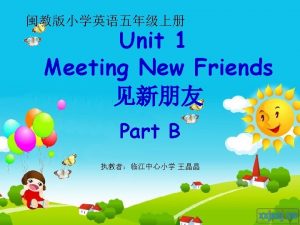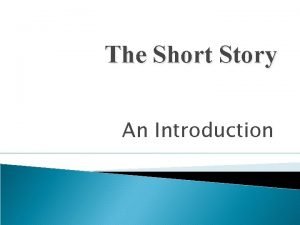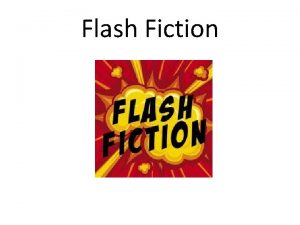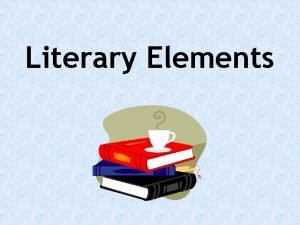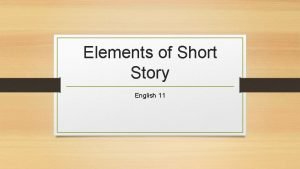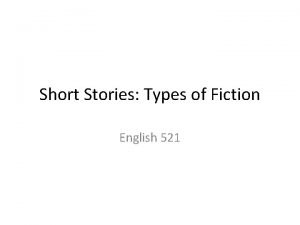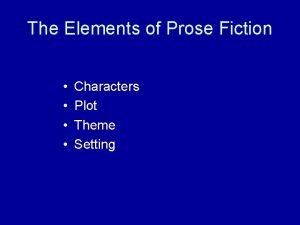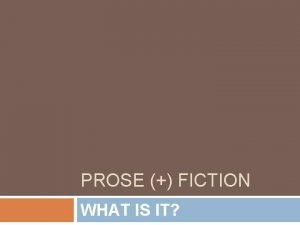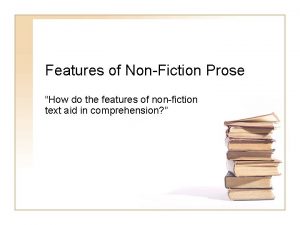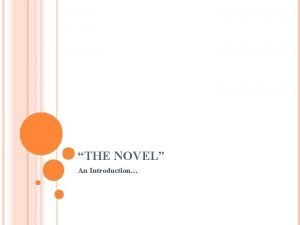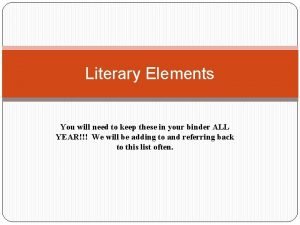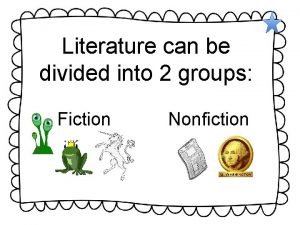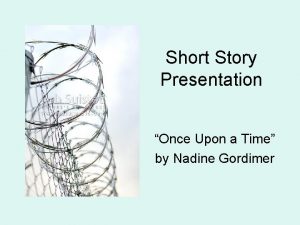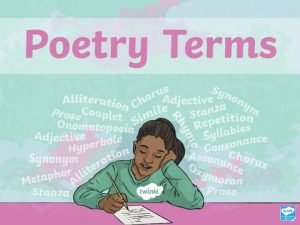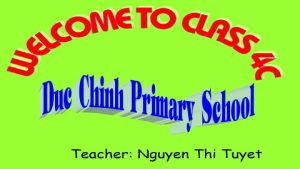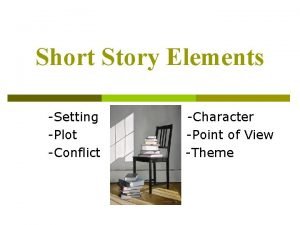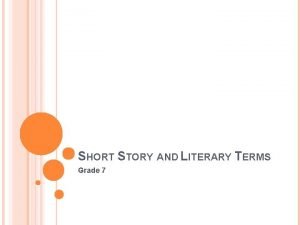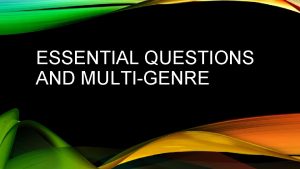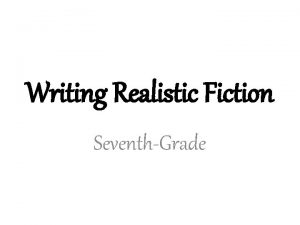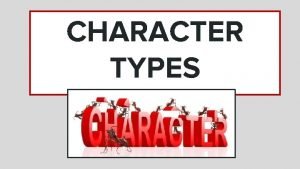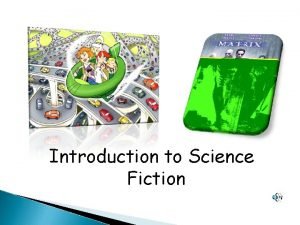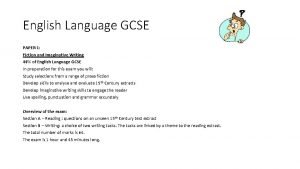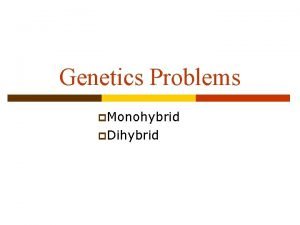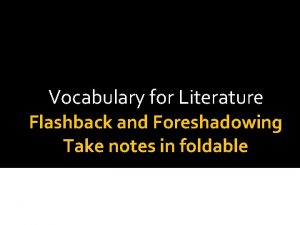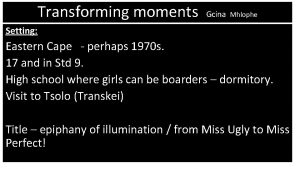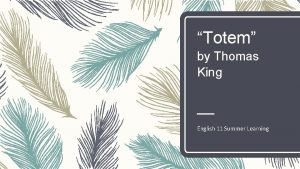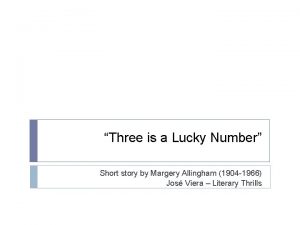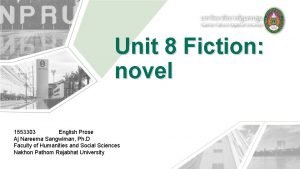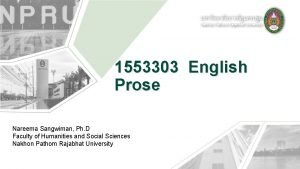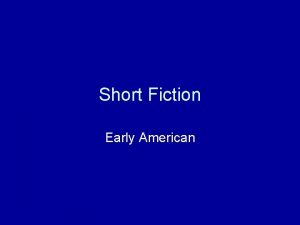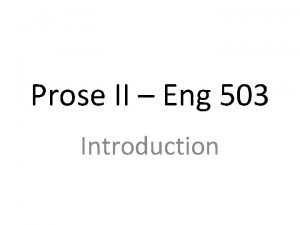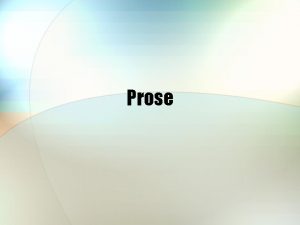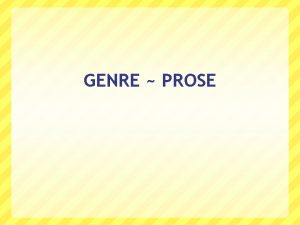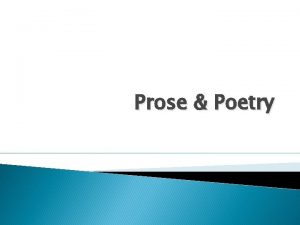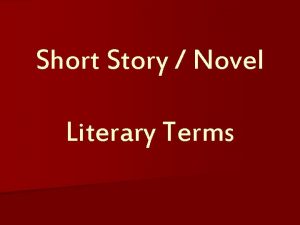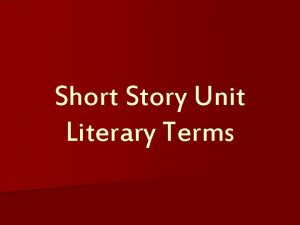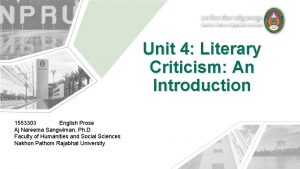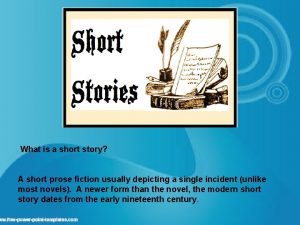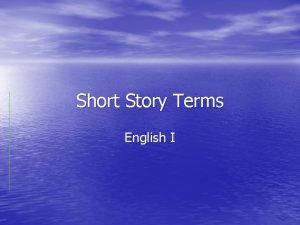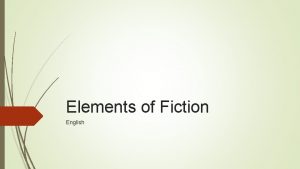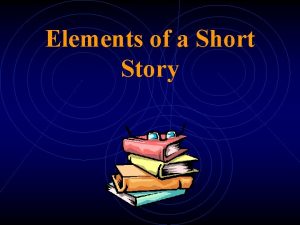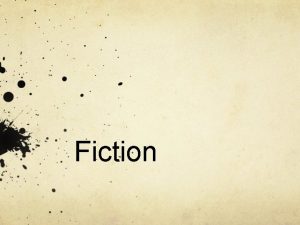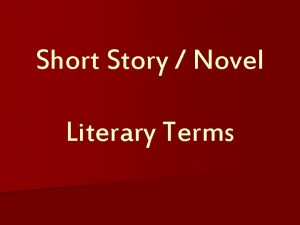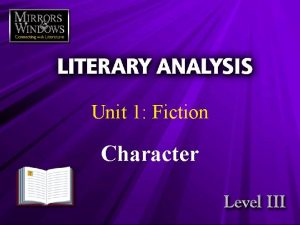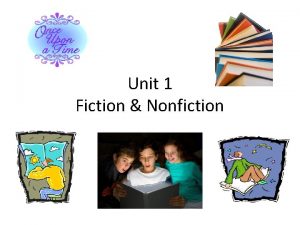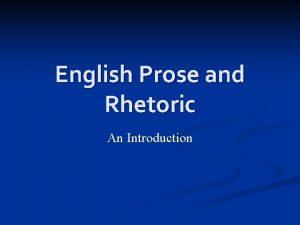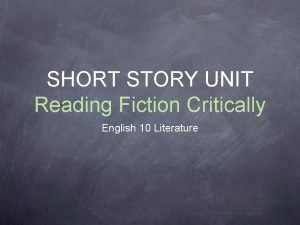Unit 7 Fiction Short Story 1553303 English Prose












































- Slides: 44

Unit 7 Fiction: Short Story 1553303 English Prose Aj Nareema Sangwiman, Ph. D Faculty of Humanities and Social Sciences Nakhon Pathom Rajabhat University

Scope of unit C Literary terms and useful vocabulary C Definitions and history of English and American short stories C Recommended reading C Unit summary C Comprehension questions

After studying this unit, students will be able to… ~ List the significant features of short story. ~ Analyze the selected text by applying literary elements. ~ Apply literary criticism to interpret text critically.

Literary terms and vocabulary cliché anecdote sketch propaganda utopia

Literary terms and vocabulary pathos satire archetyp e tragedy cathar sis

Short Story A brief fictional prose narrative that is shorter than a novel and that usually deals with only a few characters. https: //www. britannica. com/art/short-story

Short Story single effect a complex plot concise narrative economy of setting a few significant episodes character is disclosed in action https: //www. britannica. com/art/short-story

Short Story single impression highly economical word minimal resolution capable of being read single predesigned effect sentence should initiate the predetermined https: //www. britannica. com/art/short-story

Significant features of short story § Take a PLOT and fit characters to it. § Take a CHARACTER and choose incidents to develop it. § Take an ATMOSPHERE and get actions and characters to develop it. § Take an IDEA and use characters and action to http: //johnwatsonsite. com/My. Class. Notes/Topics/Short%20 Story/Ch%27 c s. Short. Story. html develop this.

A brief history of American and English short story C The Americans, the short story had become ‘a national art form. C The short story in America has for almost two centuries held a prominent, even pre-eminent place in the American literary tradition.

A brief history of American and English short story C Edgar Allan Poe; and the short story was for Poe his most successful and influential literary form. A number of other American writers in both the nineteenth and the twentieth centuries have, arguably, done their best work in that medium.

A brief history of American and English short story C The state of short story publication in England offers an acute illustration of the form’s cultural and economic marginality.

A brief history of American and English short story C Short story critics have often viewed English literature as dominated by the novel, and consequently have tended to diminish the achievements of English short storywriters.

A brief history of American and English short story C The word ‘taxonomy’ describes a system of classification. The history of short story criticism has largely been concerned with questions of taxonomy, in particular the essential features that define the short story.

Reading and interpretation N Interpretation is reading for meaning. N In reading for meaning, we look for what is significant, for what matter, and what is the writing adds up to. NInterpretation is something we do every time we read.

Reading and interpretation N An interpretation is like traveling down a road, we can only get to where the road leads. NInterpretation would be circular. We would always come back to the point from which we start.

Unit summary

Reading and interpretation

Treating books as art

Shapes, forms and structures

Recommended reading

Hans Christian Andersen


Selected reading: Short story “The Story of an Hour” is Kate Chopin's short story about the thoughts of a woman after she is told that her husband has died in an accident. The story first appeared in Vogue in 1894 and is today one of Chopin's most popular works. https: //www. katechopin. org/the-story-of-an-hour/

Louise Mallard She is the protagonist in the story, and the only dynamic character that appears in the whole plot. Josephine Mallard flat character Brently Mallard Louise’s husband The story may take place in a small mansion in England, probably at the time in which Chopin published the manuscript – around the year 1894. Richard Foil character: messenger

>> Heart >> Time: An hour >> Season > autumn > spring Desire VS Self. Determination new life A Growing Awareness of Freedom Death

Historical context 1 Victorian era courtship rules and marriage facts 2 The Victorian period is also regarded as the era of Romanticism 3 4 After marriage, the property of the woman was automatically transferred to her husband. A woman was never permitted to go out alone and meet a gentleman.

Historical context 1 A woman was allowed some liberties. 2 After marriage, the woman played the role of a dutiful wife and mother. 3 4 The marriages in Victorian girls had been brought up with firm intentions of marrying a suitable husband of the same or higher social class. this period were treated more like a business deal than a romantic gesture or expression of love.

A significance of Space and Place 1 Woman’s household 2 Domestic kingdom 3 Public sphere 4 New world Reality of life

Point of View 1 Chopin describes a complete story that's not limited to the protagonist's point of view. 2 3 3 rd person omniscient narrative This point of view brings Mrs. Mallard more sympathetic and understandabl e. 4 As told by the narrator, though, it seems like Mrs. Mallard is helpless under the greater weight of human truths.

Reading female writing: Freedom and self -worth 01 "open window" through which she sees the "open square" in front of her house 02 The repetition of the word "open" emphasizes possibility and a lack of restrictions. 03 The trees are "all aquiver with the new spring of life, " the "delicious breath of rain" is in the air, sparrows are twittering… 04 Describing Louise's gaze, Chopin writes, "It was not a glance of reflection, but rather indicated a suspension of intelligent thought.

Assignments Choose the correct answer. (Based on The Story of an Hour) item 1 -15. 1. Why does the family gently break the news of death to Mrs. Mallard? a. They’re afraid that she might not believe. b. They know that she is afflicted a heart trouble. c. They’re afraid she will cry so much. d. They know that she doesn’t care about her husband. 2. Those who tell Mrs. Mallard the news are trying to make sure that she. . . a. retains some hope b. does not realize the full truth c. is not suddenly shocked d. is given ample opportunity to be alone 3. How does her husband supposedly die? a. He dies in civil war. b. Someone kills him. c. He has a car accident. d. He dies in a train accident.

Assignments Choose the correct answer. (Based on The Story of an Hour) 4. How did Richards hear about the railroad disaster? He heard about it at the newspaper office. He heard about it from Josephine. He received a telegram. He read about it in the newspaper. 5. How does Mrs. Mallard respond to the news of her husband at first? a. She just stares. b. She cries. c. She locks herself in her room. d. She laughs.

Assignments Choose the correct answer. (Based on The Story of an Hour) 6. Mrs. Mallard realizes that what is most important to her is. . . . . a. self-respect b. self-protection c. self-esteem d. self-awareness 7. When Mrs. Mallard wants to be alone, Josephine is concerned that her sister is. . . a. dying b. denying reality c. overcoming with grief d. realizing that she is free 8. What happened to Mr. Mallard, according to the story? a. He was cheated his friend Richard in a business deal. b. Nothing happened to him. c. He was left his wife for another woman d. He was killed in a train accident.

Assignments Choose the correct answer. (Based on The Story of an Hour) 9. What happens to Mrs. Mallard at the end of the story? a. She enjoys a moment of triumph. b. She faints with joy. c. She begins to make funeral arrangements. d. She dies of heart attack. 10. Mr. Mallard returning home in the story is what part of the plot? a. Rising action b. Resolution c. Climax d. Falling action


Unit summary

Comprehension questions

Comprehension questions

Comprehension questions

Comprehension questions

Comprehension questions

Comprehension questions

you
 Short short short long long long short short short
Short short short long long long short short short Short story examples
Short story examples Flash fiction elements
Flash fiction elements Short story with elements of literature
Short story with elements of literature Five element of a story
Five element of a story ছোট গল্প
ছোট গল্প Stories
Stories Plot and characters
Plot and characters Prose definition
Prose definition Unsur-unsur pembangun prosa
Unsur-unsur pembangun prosa Prose narrative
Prose narrative What is nonfiction prose
What is nonfiction prose Prose fiction
Prose fiction Prose fiction
Prose fiction Genre of speculative fiction
Genre of speculative fiction What is fiction and nonfiction
What is fiction and nonfiction Contemporary realistic fiction vs historical fiction
Contemporary realistic fiction vs historical fiction Fiction and non fiction activities
Fiction and non fiction activities Short story once upon a time
Short story once upon a time Prose definition
Prose definition The fur coat by sean o'faolain
The fur coat by sean o'faolain Cat and mouse story in english
Cat and mouse story in english Short story with characters setting and plot
Short story with characters setting and plot Short story unit
Short story unit Short story unit
Short story unit Short story test review
Short story test review Terms of setting
Terms of setting Short story essential questions
Short story essential questions Realistic fiction story ideas for 7th grade
Realistic fiction story ideas for 7th grade Dynamic character
Dynamic character Fictional story
Fictional story What is science fiction story
What is science fiction story Paper 1 fiction and imaginative writing
Paper 1 fiction and imaginative writing English unit conversions
English unit conversions Unit 10, unit 10 review tests, unit 10 general test
Unit 10, unit 10 review tests, unit 10 general test Heterozygous short-hair x heterozygous short-hair
Heterozygous short-hair x heterozygous short-hair The baby donald barthelme
The baby donald barthelme What's the worst that could happen short story questions
What's the worst that could happen short story questions What is a novelette
What is a novelette Flashback in literature
Flashback in literature Battle royal in invisible man
Battle royal in invisible man Transforming moments book
Transforming moments book Totem by thomas king symbolism
Totem by thomas king symbolism Ninny story
Ninny story Three is a lucky number by margery allingham
Three is a lucky number by margery allingham
